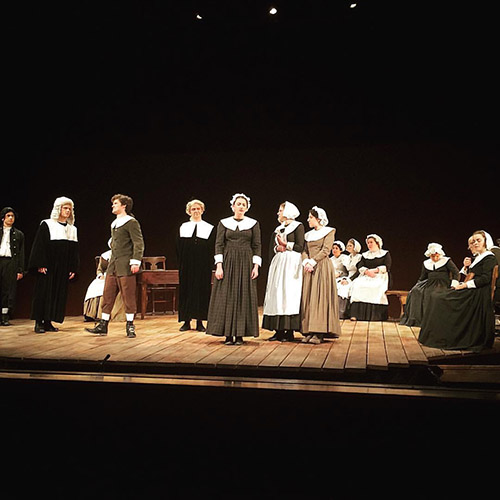‘The Crucible’ inspires historic, emotional themes

THE CRUCIBLE’S CLIMAX: Revealing a shocking secret, John Proctor, played by senior Chuck Quinn IV, sends a tremor through the courtroom in this dramatic scene. The Crucible was the fall play at South this year that told the story of the Salem witch trials.
November 6, 2015
Two female characters standing on a bed clasp each other’s hands in panic as they begin to trade off claims that various village people are witches. As the ominous list of accusations grows longer, the light dims and applause comes from the audience, marking the end of the first act of South’s fall play, The Crucible. South’s actors, producers and stage crew worked together to portray the paranoid community of 1692 Salem. The play took place Oct. 23 and 24.
According to Director John Knight, The Crucible was chosen as the fall play to honor the 100th birthday of its writer, Arthur Miller. The play is based on a true story about the Salem witch trials, in which various women were accused of witchcraft and could only be saved from execution by confessing to these false accusations. The accused witches could also protect their lives by implicating others of witchcraft.
“[The Crucible] is enjoyable to perform because the actors get to learn about how life was 400 years ago in terms of the costuming, the way people talked [and] the way people moved,” Knight said. “The societal norms were very different, and it has been interesting for the actors to learn about that.”
One of the main characters in the play is John Proctor, who was played by senior Chuck Quinn IV. Proctor is a Puritan farmer and the first man to be accused of witchcraft. According to Quinn, Proctor was the only character who did not believe that witchcraft was taking place in Salem.
“[Proctor] is […] a pretty difficult character, because he has a lot of intense conflicting emotions a lot of the time, so it’s hard to get that balance right and show that conflict to the audience,” Quinn said. “On one hand, he is mad at the court and the village of Salem for believing this nonsense and lies; on the other hand, he hates himself because of the affair he had with one of the […] witches, and he doesn’t see himself as a good man.”
Another lead in the play is Proctor’s wife, Elizabeth Proctor, who is played by senior Rory Penepacker. She was one of the wrongfully accused victims of the witchcraft. According to Penepacker, Elizabeth is also a character who has two conflicting sides.
“Elizabeth is complex in the way where she is a moral beacon of light in the show and in the town,” Penepacker said. “For John, especially, she is a place of clarity when the town is ascending into madness, but at the same time, she also has her own flaws.”
The actors are not the only people responsible for the success of the play. According to Knight, producing a successful play is a team effort between multiple groups of people with different areas of expertise.
“We have a huge team that works together,” Knight said. “The set designer, the stage crew, the costumers [and] the actors all have to really work with each other, listen to each other and be very open to collaborate.”
The play was performed on a raked stage, which means that the back of the stage is raised to be higher than the front. According to junior Justin Kalish, stage crew member, this posed a challenge for both the stage crew and actors.
“This set is on an 11-degree angle, so everything we did is slanted, which makes it really tough for the actors, and people who are placing props, because [they] need to make sure [props] don’t move when [they] are on this pitch,” Kalish said.
According to Penepacker, the play is enhanced on the day of performance when all the aspects of the show come together. Performance night transforms the actors into the characters.
“When all the costumes, lights and sounds come together, it’s so cool to get into the moment,” Penepacker said. “Of course, your friends are on stage with you, but when they’re in costume and in character, it’s easy to get into the moment, and you can’t ignore the audience because the audience becomes a part of it. So it’s not like you’re in Salem, but you’re on the stage that is Salem.”
Quinn added that the audience is a large part of a performance, because they contribute to the vibe of the auditorium and have an affect on the performers on stage.
“The audience really adds an energy to the show that really helps you give your all and give an honest emotional performance,” Quinn said.
Quinn said that the Theater Department has been a large part of his high school career, and having a play that he loved for his last fall play at South was very important to him.
“I thought it was a great [play] to go out on because it is such a challenging piece, and the characters are so rich and each scene is filled with so much depth that there are so many places you could take it,” Quinn said. “I was really happy to have this play for my senior year.”
As the performance of this year’s fall play concluded, Quinn and Penepacker wrapped up their four-year run of performing in fall plays. They commented that the tools and friends they’ve taken away from the experiences will be with them forever.
“It is kind of emotional for us because we have been with the same people for so long and we are so deeply connected to this department,” Penepacker said. “We love theatre so much, so it is sad to be saying good-bye.”


